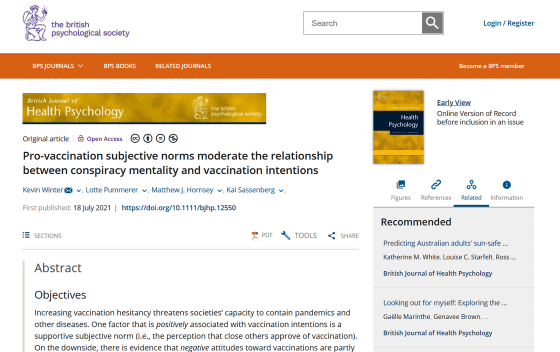Conspiracy theorists, who tend to be anti-vaccines, also found that 'if friends and family support the vaccine, they are more likely to get it.'

Conspiracy theorists tend to believe that there is 'some mighty organization or plot behind the scenes' about events and situations in the world, and know that they are prone to
Pro-vaccination subjective norms moderate the relationship between conspiracy mentality and vaccination intentions --Winter ---- British Journal of Health Psychology --Wiley Online Library
https://bpspsychub.onlinelibrary.wiley.com/doi/full/10.1111/bjhp.12550

People with a conspiracy mindset are no less likely to accept vaccines — so long as their friends accept them, too
https://www.psypost.org/2021/08/people-with-a-conspiracy-mindset-are-no-less-likely-to-accept-vaccines-so-long-as-their-friends-accept- them-too-61640
Friends of Conspiracy Theorists May Help Reduce Vaccine Hesitancy, Study Shows
https://www.sciencealert.com/friends-of-conspiracy-theorists-can-make-a-difference-to-vaccine-hesitancy
Past studies have shown that conspiracy theorists who have different ideas from the mainstream view are more likely to oppose the generally accepted vaccination. Since the room for people who do not vaccination is more prevalent virus often remain, anti-vaccine has been regarded as a public health threat, in 2019 the WHO ' threat of 10 with respect to the health of the world anti-vaccine' I have listed it.
And the pandemic of the new coronavirus infection (COVID-19), which has hit the world since 2020, highlights the negative effects of anti-vaccines. Each country is making efforts to increase the vaccination rate by developing ' services that give cash and giveaways to vaccinated people ', but 'the effect of improving the vaccination rate on cash distribution and lottery is almost the same. There is also a research result that says 'No.'
A research team led by Kevin Winter , a postdoctoral researcher at the University of Tubingen, Germany, conducted an experiment to examine the impact of people around the conspirator's attitude toward vaccination. 'It was clear that we needed to do more research on this topic to find a potential starting point to intervene in vaccine controversy rooted in conspiracy theories,' Winter said.
'Human beings are social animals, and their perceptions are highly dependent on the beliefs and attitudes of others close to us, such as friends and family. These perceptions are often referred to as'subjective norms'.' Pointed out. Since subjective norms do not always match the norms of society as a whole, experiments are based on the hypothesis that even conspiracy theorists who reject socially mainstream views may accept subjective norms. The we.

In five experiments, the research team collected a total of 1280 subjects who said they were hesitant to vaccinate but did not completely refuse vaccination. For subjects in each of the study, 'in order to protect children from hepatitis B' vaccine required to travel to foreign countries '
The team also asked subjects 'whether they think they support vaccination,' and measured how likely they were to believe in conspiracy theory. At the time of this experiment, the COVID-19 vaccine was not yet available.
As a result of analyzing the experimental results, it was confirmed that those who are less likely to be conspiracy theorists are more likely to accept vaccination, and those who believe in conspiracy theories are more likely to avoid vaccines. However, if the subject perceives that 'the person they care about supports the vaccine,' it turns out that they are more likely to accept the vaccine, even if they are more conspiracy theorists.
'The central point of our treatise is that susceptibility to conspiracy theory is not unconditionally associated with reduced willingness to get vaccinated,' said Winter. 'What do other people think about vaccination?' 'Our findings predict that conspiracy theories predict vaccination when friends and family approve vaccination.' It suggests that it is no longer playing its role. '

The results of this study show that if you want to vaccinate a person who is devoted to conspiracy theory, instead of trying to deny and persuade the conspiracy that the person believes, close people such as friends and family will vaccinate. It suggests that expressing support for the may be sufficient.
However, this study only found a correlation, and did not prove that 'changing conversations with conspiracy theorists increases the tendency to accept vaccination.' In addition, the subjects of the study were 'people who hesitated to vaccinate', and 'people who completely refused the vaccine' were not included in the subjects. Therefore, it is possible that the results of this survey may not apply to those who are really persistently refusing the vaccine.
Related Posts:
in Note, Posted by log1h_ik







